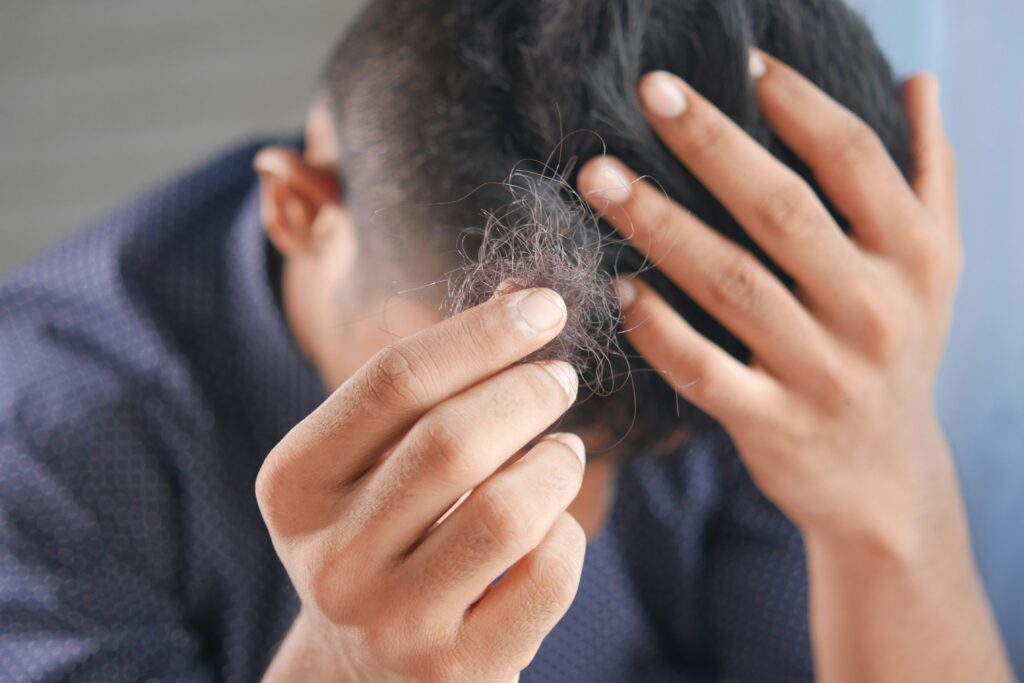
Articles
Stress, female hair loss and the hormone cortisol
Cortisol
The fact that you feel alert in the morning when you are healthy and balanced, and that you find it difficult to get out of bed in times of stressand strain, has a lot to do with the hormone cortisol.
Cortisol production takes place in the adrenal glands, and cortisol levels play a major role in overall health.
In prolonged periods of stress, these levels are disrupted, which can have consequences for hair, skin, sleep and health – but simply “stopping stressing” is easier said than done.
However, cortisol secretion varies according to activity and different times of day.
Excretion increases, for example, when we eat things that raise blood sugar levels, when we exercise and the substance is released in the morning just as we wake up, when it helps us to wake up. Cortisol is also released when we are stressed.
So you could say that cortisol channels energy. But some things can disrupt the normal variation of release.
Under prolonged stress, daily cortisol secretion is too high and adrenal function is pushed to the limit. This works for a while, but not in the long run.
High levels throughout the day initially make you feel alert and difficult to unwind, but if this goes on for long, the adrenal glands get tired.
This means the body can’t produce enough cortisol when we really need it – like on a dark winter’s morning when you have to get up early for work.
Thus, overproduction and release can eventually lead to extreme fatigue, increased susceptibility to illness and feelings of depression.
High levels of the hormone negatively affect both skin and hair and cortisol blocks oestrogen, making women more sensitive to stress and how stress manifests itself physically.
During the consultation with us, the first step is to verbally review the past year to see if anything unusual has occurred, it may be an event that caused stress which in turn led to hair loss that you as a client may not have thought of yourself.
Dealing with stress
But stress can be caused by an extremely wide range of things and can be the result of both physical and psychological trauma.
But not all stress is dangerous, as long as you know how to unwind and deal with it – which can really be easier said than done.
There is a lot of discussion about stress in our society and lately we have seen some tools and perhaps some unexpected trends emerge as a possible help, maybe one of these suits you?
Mental training and relaxation. To some, this sounds corny, but training your brain to relax doesn’t have to
mean meditating three hours a day and dedicating your life to yoga. It can be as little as 5 minutes a day when you close your eyes and try to focus only on the present.
Today there are many meditation apps with short sessions designed to fit into a stressful life, such as Mindfulness.
Spending more time planning can help people feel more in control of their lives. Because it’s often a sense of lack of control that leads to stress.
For some, it’s nice to physically check off completed tasks and chores, which is one of the features of the Remember the milk app.
You may have read about the latest trend? Coloring books for adults for fun and relaxation.
Exercise. There are so many different forms of exercise and which one you prefer is of course different. But even if
the body is strained during exercise, the head often relaxes.
For many, a brisk walk is enough to make them feel more relaxed. The app 7 Minute Workout app is like your personal PT for 7 minutes a day, and will definitely make you let go of everything else for a little while.
Breathe! Breathing is an absolutely central part of relaxation and meditation, but it can be difficult to know how to do at first. Breathe2relaxis a very user-friendly and visually guiding app with a focus on breathing.




